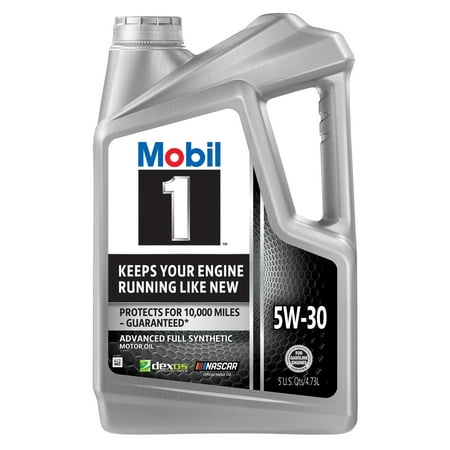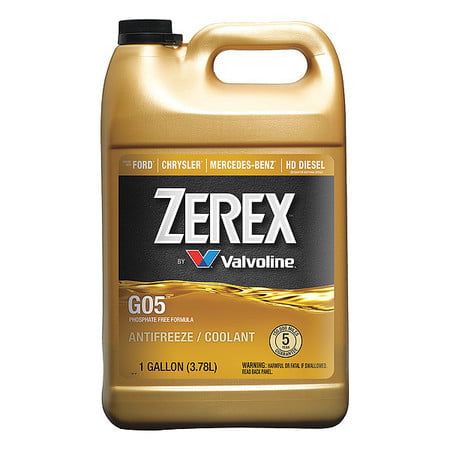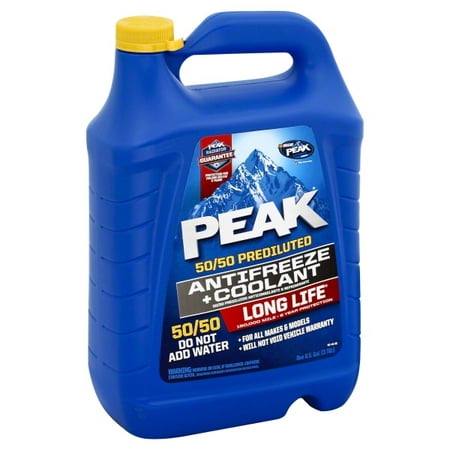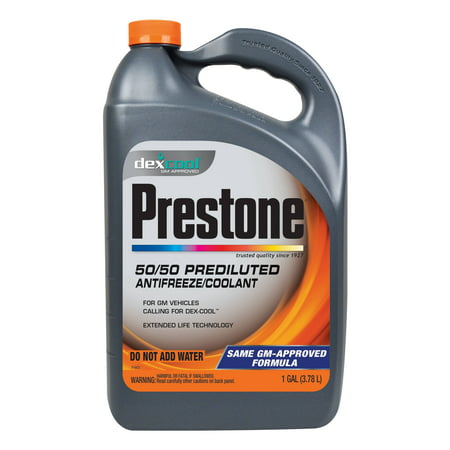(9 Pack) Mobil 1 Advanced Full Synthetic Motor Oil 5W-30, 5 Quart
Mobil 1 advanced full synthetic motor oil 5W-30 helps to extend engine life for vehicles of all ages. Mobil 1 advanced synthetic motor oil is designed to deliver outstanding engine protection from the five factors that can damage engines over time and protect critical engine parts for up to 10,000 miles between oil changes*. Its uniform synthetic oil molecules reduce friction, helping to prevent deposits and sludge buildup. This technologically advanced motor oil formulation provides excellent internal engine heat protection (up to 500 degrees Fahrenheit), and low-temperature capabilities (to -40 degrees Fahrenheit), supporting quick cold-weather starting and ultra-fast protection. Mobil 1 advanced full synthetic motor oil meets ILSAC GF-6 standards to help provide low-speed pre-ignition (LSPI), timing chain wear protection while keeping your engine clean and helping your fuel economy. Available in 1-qt. and 5-qt. bottles, Mobil 1 advanced full synthetic motor oil 5W-30 also helps control oxidation to prevent oil breakdown and is recommended for all types of modern vehicles, including high-performance turbo-charged, and supercharged gasoline and diesel multi-valve fuel-injected engines found in passenger cars, SUVs, light vans, and light trucks. Mobil 1 is Americaâs leading synthetic motor oil brand at retail**, recommended by car builders and experienced mechanics, and is the Official Motor Oil of NASCAR®. (*Protects for up to 10,000 miles or 1 year, whichever comes first. To learn more about the Mobil 1 Limited Warranty, visit Mobil.US. **Source: The NPD Group/ Retail Tracking Service/ Dollar Sales/ 52 weeks ending April 4, 2020)







Mobil 1 advanced full synthetic motor oil 5W-30 helps to protect your engine from the five factors that can damage engines over timeHelps to protect critical engine parts for up to 10,000 miles between oil changes*, controlling oxidation to prevent oil breakdown and maintaining excellent viscosityMeets ILSAC GF-6 standards to help provide low-speed pre-ignition (LSPI), timing chain wear protection while keeping your engine clean and helping your fuel economyHelps extend engine life by working to prevent damaging deposits and sludge buildupProvides excellent internal engine heat protection (up to 500 degrees F) and low temperatures (to -40 degrees F)
1 (one, unit, unity) is a number representing a single or the only entity. 1 is also a numerical digit and represents a single unit of counting or measurement. For example, a line segment of unit length is a line segment of length 1. In conventions of sign where zero is considered neither positive nor negative, 1 is the first and smallest positive integer. It is also sometimes considered the first of the infinite sequence of natural numbers, followed by 2, although by other definitions 1 is the second natural number, following 0.
The fundamental mathematical property of 1 is to be a multiplicative identity, meaning that any number multiplied by 1 equals the same number. Most if not all properties of 1 can be deduced from this. In advanced mathematics, a multiplicative identity is often denoted 1, even if it is not a number. 1 is by convention not considered a prime number; this was not universally accepted until the mid-20th century. Additionally, 1 is the smallest possible difference between two distinct natural numbers.
The unique mathematical properties of the number have led to its unique uses in other fields, ranging from science to sports. It commonly denotes the first, leading, or top thing in a group.
30 may refer to:
- 30 (number), the natural number following 29 and preceding 31
- one of the years 30 BC, AD 30, 1930, 2030
5 (five) is a number, numeral and digit. It is the natural number, and cardinal number, following 4 and preceding 6, and is a prime number. It has garnered attention throughout history in part because distal extremities in humans typically contain five digits.
Five is the third-smallest prime number, and the second super-prime, since its prime index is prime. Notably, 5 is equal to the sum of the only consecutive primes 2 + 3 and it is the only number that is part of more than one pair of twin primes, (3, 5) and (5, 7), also making it the first balanced prime with equal-sized prime gaps above and below it (of 2). 5 is the first safe prime where for a prime is also prime (2), and the first good prime, since it is the first prime number whose square (25) is greater than the product of any two primes at the same number of positions before and after it in the sequence of primes (i.e., 3 × 7 = 21 and 11 × 2 = 22 are less than 25). 11, the fifth prime number, is the next good prime, that also forms the first pair of sexy primes with 5. More significantly, the fifth Heegner number that forms an imaginary quadratic field with unique factorization is also 11 (and the first repunit prime in decimal, a base in-which five is also the first non-trivial 1-automorphic number).
Five is also the second Fermat prime, and the third Mersenne prime exponent, as well as the fourth or fifth Fibonacci number. It is also an Eisenstein prime (like 11) with no imaginary part and real part of the form . It is the first congruent number, as well as the length of the hypotenuse of the smallest integer-sided right triangle, making part of the smallest Pythagorean triple (3, 4, 5). The regular five-sided pentagon is the first regular polygon that does not tile the plane with copies of itself, and it is the largest face that a regular three-dimensional regular Platonic solid can have, as represented in the regular dodecahedron. In general, a conic curve will require five points in the same way that two points are needed to determine a line.
Full may refer to:
- People with the surname Full, including:
- Mr. Full (given name unknown), acting Governor of German Cameroon, 1913 to 1914
- A property in the mathematical field of topology; see Full set
- A property of functors in the mathematical field of category theory; see Full and faithful functors
- Satiety, the absence of hunger
- A standard bed size, see Bed
- Fulling, also known as tucking or walking ("waulking" in Scotland), term for a step in woollen clothmaking (verb: to full)
- Full-Reuenthal, a municipality in the district of Zurzach in the canton of Aargau in Switzerland
Mobil is a petroleum brand owned and operated by American oil and gas corporation ExxonMobil. The brand was formerly owned and operated by an oil and gas corporation of the same name (Mobil Oil Corporation), which itself merged with Exxon to form ExxonMobil in 1999.
A direct descendant of Standard Oil, Mobil was originally known as the Standard Oil Company of New York (shortened to Socony) after Standard Oil was split into 43 different entities in a 1911 Supreme Court decision. Socony merged with Vacuum Oil Company, from which the Mobil name first originated, in 1931 and subsequently renamed itself to Socony-Vacuum Oil Company. Over time, Mobil became the company's primary identity, which prompted a renaming in 1955 to the Socony Mobil Oil Company, and then in 1966 to the Mobil Oil Corporation. Mobil credits itself with being the first company to introduce paying at the pump at its gas stations, the first company to produce jet aviation fuel, as well as the first company to introduce a mobile payment device, today known as Speedpass.
In 1998, Mobil announced it was merging with Exxon to form ExxonMobil, reuniting the two largest descendants of Standard Oil. The technicalities of the merger, which was completed on November 30, 1999, showed that Exxon bought Mobil, and Mobil shareholders received a payment of stock in Exxon. Mobil continues as a brand name within the combined company, as well as still being a gas station sometimes paired with its own store or On the Run. Mobil's brand name is primarily used to market motor oils, such as Mobil 1. The former Mobil headquarters in Fairfax County, Virginia, was used as ExxonMobil's downstream headquarters until 2015 when ExxonMobil consolidated employees into a new corporate campus in Spring, Texas.
An oil is any nonpolar chemical substance that is composed primarily of hydrocarbons and is hydrophobic (does not mix with water) and lipophilic (mixes with other oils). Oils are usually flammable and surface active. Most oils are unsaturated lipids that are liquid at room temperature.
The general definition of oil includes classes of chemical compounds that may be otherwise unrelated in structure, properties, and uses. Oils may be animal, vegetable, or petrochemical in origin, and may be volatile or non-volatile. They are used for food (e.g., olive oil), fuel (e.g., heating oil), medical purposes (e.g., mineral oil), lubrication (e.g. motor oil), and the manufacture of many types of paints, plastics, and other materials. Specially prepared oils are used in some religious ceremonies and rituals as purifying agents.
The quart (symbol: qt) is a unit of volume equal to a quarter of a gallon. Three kinds of quarts are currently used: the liquid quart and dry quart of the US customary system and the imperial quart of the British imperial system. All are roughly equal to one liter. It is divided into two pints or (in the US) four cups. Historically, the exact size of the quart has varied with the different values of gallons over time and in reference to different commodities.
Synthetic things are composed of multiple parts, often with the implication that they are artificial. In particular, 'synthetic' may refer to:





Reviews
There are no reviews yet.